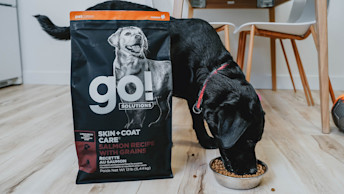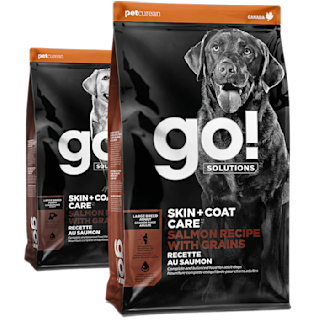May 12, 2023
How to Feed a Large Breed Puppy

Puppies have different nutritional requirements than adult dogs, and large breed dogs have different nutritional requirements than small breed dogs. Together, these differences make feeding a large breed puppy quite a complex task. A large breed puppy formula should provide everything that your pup needs to grow and develop into a strong and healthy adult. Keep reading to learn more!
Nutritional requirements of large breed puppies
Energy intake
According to the Association of American Feed Control Officials (AAFCO), "large breed" refers to
dog breeds that typically grow to an adult weight of 70 lbs. or more.1
Unlike smaller dogs that remain relatively similar in size throughout their life, an average large breed puppy undergoes a 70-fold increase in size during their first year.2 This rapid growth introduces new challenges and requirements that must be addressed by adequate nutrition to ensure a healthy transition to their adult size. Large breed puppies are genetically programmed to grow at a faster rate than small breed dogs.3 Rapid growth can lead to improper development of your pups bones and joints and increase their risk for associated diseases. Therefore, it is crucial that we ensure our large breed pups are growing at the proper pace in order to support and maintain skeletal health and longevity.
Overfeeding your pet can contribute not only rapid growth, but also excessive body weight and this extra body weight can place unwanted stress on the developing skeleton of your puppy.4 This also increases their risk of bone and joint issues later in life. This is especially important to consider in large breed puppies, as they have an inherently low bone density compared to growing small breeds.5 As a result, it is important to pay special attention to the energy density of the diet when feeding a large breed puppy.
Since large breed dogs have a slower rate of metabolism than small breed dogs, they require less calories per kilogram body weight. This means that you should feed a diet that is less calorie dense.
When feeding a less calorie dense diet, this lets you feed a larger quantity, allowing your pup to stay full. This is important to consider in large breeds, as their stomachs are much larger than small breeds.
Diets specific for large breed puppies are often formulated to a recommended moderate caloric density, with the goal of discouraging both overfeeding and rapid growth.6 Carbohydrates provide 4 calories per gram, protein provides 4 calories per gram, while fat provides 9 calories per gram. Therefore, in order to keep the energy density of these diets, the fat content is typically lower.
Balanced calcium and phosphorus
Unlike adult dogs, puppies do not have the ability to limit or regulate their absorption of dietary calcium.4 Because of this, excess calcium fed to large breed puppies can increase their risk for abnormal joint growth and skeletal malformations.7 In addition to this, too much phosphorus in the diet can impede calcium absorption and lead improper bone development.8 While too little phosphorus can lead to poor weight gain.6 Therefore, diets for large breed puppies must be carefully formulated to target adequate levels and an optimal balance of calcium to phosphorus.
There is no singular, defined ratio for calcium:phosphorous, and the AAFCO recommends a minimum of 1:1 to a maximum of 2:1. In 2016, the AAFCO Canine Nutrition Expert Subcommittee (CNES) published an upper limit for calcium specific to large breed growth formulations that restricts the calcium level in these products to 1.8% on a dry matter basis (DMB).1
True or false: All life stages recipes might be suitable for your large breed puppy.
True! This change in regulations has altered how the nutritional adequacy statement is declared on a bag of dog food formulated for growing puppies or all life stages. When you’re shopping for your pup's food, look out for these statements that now indicate whether a recipe is appropriate for the growth of large breed puppies. They will state either "this food is formulated to meet the nutritional levels established by the AAFCO Dog Food Nutrient Profiles for All Life stages including the growth of large size dogs (70 lb. or more as an adult)" or "except for the growth of large size dogs (70 lb. or more as an adult)."1
For a recipe to be considered appropriate for the growth of large size dogs, the calcium level must be below 1.8% DMB.
When you’re choosing your pups next meal, it’s important for you to read the nutritional adequacy statement on pet food labels to ensure your growing puppy is intaking a food that meets these unique calcium requirements.
If you are looking for a dog food specifically designed for large breed puppies, we recommend the Go! Solutions Skin + Coat Care Large Breed Puppy Salmon recipe with grains. This formula contains DHA and EPA to aid in brain and eye development, along with targeted mineral rations to support the development of healthy bones. The healthy grains in this diet will also provide your pet with energy to support their next bout of zoomies around the house. Why stop there? It is also rich in antioxidants from fruits and veggies to help support your pup's immune system, along with probiotics and prebiotic fiber for healthy digestion to keep them feeling great!

Recommended Solution
Large Breed Dog Food
Go! Solutions Skin + Coat Care Large Breed dog food recipes are crafted by experts to help your best friend look and feel their absolute best, from strong joints and sturdy bones, to healthy skin and a soft, shiny coat.
View Recipes
Conclusion
Feeding a large breed pup can be an overwhelming task, as it is crucial to consider their different nutritional requirements - however, this does not have to be a stressful task! Choose a diet tailored specifically to large breed puppies to ensure that your pet is getting the proper nutrition they need to safely grow to their adult weight and stay paws-itively happy and healthy!
References
AAFCO, Association of American Feed Control Officials: Official Publication. 2018, Atlanta, GA:
Association of American Feed Control Officials.Wynn, S. Feeding Large Breed Puppies. 2013 [cited 2018; Available from:
https://ivcjournal.com/feeding-large-breed-puppies/].Toll, P.W. and D.C. Richardson, Relationship of nutrition to developmental skeletal disease in
young dogs. Vet. Clin. Nutr., 1997. 4: p. 6-13.Larsen, J., Feeding large-breed puppies. Compend. Contin. Educ. Vet., 2010. 32(5): p. E1-4.
Page 3 of 3Dammrich, K., Relationship between nutrition and bone growth in large and giant dogs. J. Nutr.,
1991. 121(11 Suppl): p. S114-21.Lauten, S.D., Nutritional risks to large-breed dogs: from weaning to the geriatric years. Vet. Clin.
North Am. Small Anim. Pract., 2006. 36(6): p. 1345-59.Fascetti, A.J., Food for Thought on Canine Developmental Orthopedic Disease. Vet. Surg., 2006.
35(3): p. 211-213.Hazewinkel, H.A., et al., Calcium metabolism in Great Dane dogs fed diets with various calcium
and phosphorus levels. J. Nutr., 1991. 121(11 Suppl): p. S99-106.
Authors



